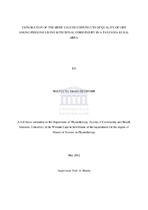| dc.description.abstract | A spinal cord injury causes a major impact on the life of individuals who experience it. From the impact of the accident or disease causing spinal cord damage, one is left immobile, insensitive to touch and dysfunction of the urinal and anal organs, which in turn leaves bowel, bladder and sexual functions in jeopardy. These impairments and activity limitations restrict or exclude the individual from participation in everyday social interaction. There is also a perceived stigma from society, depending on the response from the surrounding physical and social environment. The aim of the current study was to explore the most valued constructs of quality of life among persons with spinal cord injury in in a Tanzania rural area. The study objectives were to deduce the participants’ own understanding of quality of life and exploration of its constructs in all domains of life namely physical, social, economic and environmental with consideration to the barriers and facilitators. A qualitative study design is employed in which a sample of 15 persons with spinal cord injury living in three selected districts of the rural Kilimanjaro region, were purposefully selected. Environmental observations and semi structured interviews were conducted in the home of each participant. Transcriptions were done verbatim before translation from Kiswahili (national language) to English by the researcher then back translated by two professional translators (Appendix M, page 145). The whole translated sample was compiled, proof read by the researcher several times; and major pre-determined themes were assembled by content analysis, parallel to a generation of sub themes to form the results part of this study. The findings of the current study showed that the most valued facilitators of Quality of life are support from family and friends, having faith in God, socioeconomic connections, income generating activities and an accessible home and environment.Barriers to quality of life were inaccessible environments, unreliable social support, and lack of empowerment, negative psychological traits such as anger, fear and worries that resulted from negative community actions, beliefs and attitudes (social environment). Such findings generate a package of intrinsic issues of concern from persons with spinal cord injury which adds to the body of knowledge pertaining to quality of life and spinal cord injury. The results from the current study indicate that persons with SCI in the selected rural area are partially satisfied with their current life due to various psychosocial, economic and environmental barriers. This dissatisfaction could be used as one of the major indications of poorly perceived quality of life. The researcher recommends that a comprehensive rehabilitation program should assess and take account of subjective needs from the client’s perspective to achieve better quality of life. Due to a known fact that the infrastructure of the rural area is complex, with a number of physical
barriers, which further affects participation of persons with spinal cord injury in their communities, resolute social and political actions are necessary to rectify such environments to make it accessible for all. | en_US |

